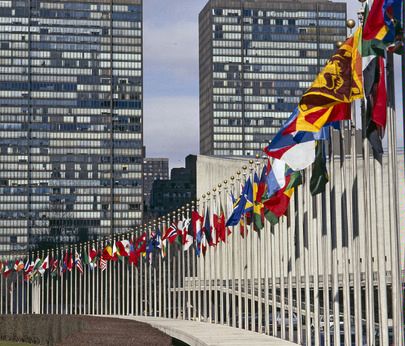
On February 21st 2012, a discussion organized by the Permanent Mission of Brazil on the concept of ‘Responsibility while Protecting’ (RwP) was held at the United Nations, co-chaired by Brazil’s Foreign Minister Patriota and UN Special Adviser for the Responsibility to Protect Edward Luck. The dialogue was based on the concept note, ‘Responsibility while protecting: elements for the development and promotion of a concept’, presented to the Security Council on 9 November 2011 by Brazil’s Permanent Representative to the UN, Maria Luiza Ribeiro Viotti, during the Council’s open debate on the protection of civilians. As first articulated by Brazilian President Dilma Roussef in her opening address to the General Assembly in September 2011, the RwP seeks to address concerns regarding the implementation of military measures in the RtoP framework, emphasizing that prevention is the “best policy” and that the use of force in particular must be monitored and assessed.
Unlike normal UN debates, the room was packed. The list of speakers grew so long that the meeting took all day, and Patriota even had to decline requests from country representatives who sought to voice strong support of RwP. In the months after RwP’s launch, it was impossible to speak about humanitarian intervention without mentioning Patriota’s proposal. Brazil was ready to confront the often arrogant P5 and gained widespread admiration around the world for its audacity. It had finally turned into a global agenda-setter. “The giant”, as one Latin American diplomat put it, “had come to stay.”
In many ways, RwP symbolized the very strategy Brazil aspired to pursue: turn into a bridge builder, mediator and consensus seeker through thought leadership. RwP, despite its flaws, was an innovative and constructive proposal to bridge the gap between an overly trigger-happy NATO and excessively resistant China and Russia. Academics in Brazil and abroad lauded Patriota’s initiative. It was the Rousseff administration’s finest multilateral initiative.
And yet, more than one year after the memorable meeting, diplomats in New York privately confess to be disappointed with what some have called Brazil’s ‘enigmatic retreat’. February 21st 2012 turned out to be the apex of Brazil’s activism. While RwP continues to be mentioned during debates, there is no longer the sense that Brazil prioritizes the matter. It has refrained from issuing an official follow-up note to deal with some of the most convincing critics. This is problematic: Brazil has distanced itself from the rigid sequencing approach that appears in the original concept note, but many commentators continue to read the only document available and believe that Brazil’s official position has not changed.
Brazilian diplomats argue that Brazil has achieved its goal. It successfully promoted the debate about one of the most complex issues of our time. They argue that now that Brazil has left the UN Security Council, it can no longer play a leading role. Others should pick up the issue and take it forward.
Yet much more would have been possible. R2P only prospered because of a small group’s tireless efforts to promote the topic. In the same way, RwP is unlikely to have a lasting impact on the debate without a powerful and credible sponsor like Brazil. No matter whether Brazil disengaged passively or actively, the move may have hurt Brazil’s national interest: Future attempts to act as an agenda-setter may receive a more hesitant reception because of a general uncertainty about Brazil’s willingness to follow-up and withstand the initial (and normal) criticism.
On the other hand, the RwP initiative may have been useful to provide a glimpse of what Brazil is capable of on a global scale. Despite Brazil’s limited hard power, it temporarily exercised international leadership in a debate that is likely to shape international affairs for decades to come.
Read also:
Brazil as a Norm Entrepreneur: The Responsibility While Protecting
The BRICS and R2P: Was Syria an exception?
Book review: “Global Politics and the Responsibility to Protect” by Alex J. Bellamy
Photo credit: United Nations








